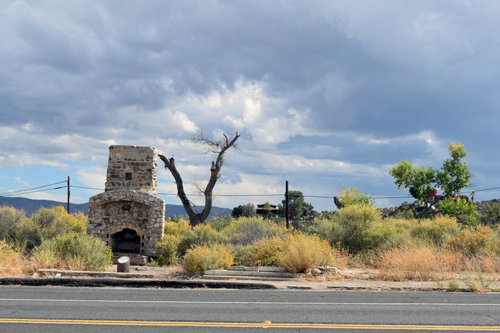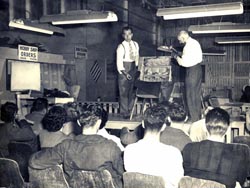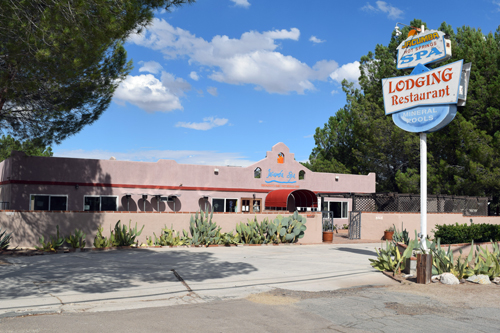
-68th in a Series–
Exit 73, Jacumba Hot Springs, California
By Donald H. Harrison

JACUMBA HOT SPRINGS, California — At one point, Henry LaZare owned practically the entire town of Jacumba, including its water company and the storied Jacumba Hotel, where legend has it that such Hollywood stars as Clark Gable and Marlene Dietrich liked to hang out in the 1930s.
Located near the border of Baja California, Mexico, and the boundary line between San Diego County and Imperial County, Jacumba’s 2,800 foot elevation also drew Imperial Valley residents seeking to escape the summer heat in the days before homes were air conditioned.
Longtime Jacumba resident Beverly Woodward remembers LaZare quite kindly. In 1947 when she was about to be married to James Woodward, the water to her home was limited because pipes were being replaced. LaZare offered her a room at the hotel to prepare for her wedding, which was conducted in the old Community Church. Like the hotel that church is no longer standing.
Asked to describe the old four-story hotel, Woodward said: “You stepped in the front door off the veranda into a huge room that had a huge, beautiful rock fireplace… When you first stepped in, to the right there was an alcove where you would check in. The receptionist also served as the secretary for the LaZare Water Company, and you paid your water bills there. The secretary also helped alert people when we had a fire. My husband was the fire chief for many years and when there would be a fire, I would call the hotel, and she would go through the list and notify all the volunteers. Past her desk was a stairway that went straight up to the guest rooms. There was a bar adjacent to the dining room, east of the front door. It was a well-lit room.”
Another longtime resident, Shirley Fisher, said at a time when she was experiencing trouble walking, LaZare invited her to stay at the hotel, and “it was lovely, a great place, homey and nice. It wasn’t elegant, just nice and homey. Everyone ate at the same time in the dining room. He was kind. In the old country, he was a chiropractor, specializing in rehabilitation.”
As for the guest rooms, “the one I stayed in was very nice; it was old fashioned, not fancy, kind of sparse like a Motel 6. Since they had movie stars who’d come there, they probably hat fancier rooms. I think mine cost $20 per day” back in the 1950s.
All this was during Jacumba’s golden era, when the major route between San Diego and points east—Highway 80—passed through the heart of town. But time worked reverse alchemy on Jacumba, turning gold to dross. In April 1967, a new highway, Interstate 8, bypassed downtown Jacumba, and although the town lay only three miles from Exit 73, most motorists kept right on driving. Eventually, many businesses were boarded up, but dreams of revitalizing the town, and bringing it back to its former glory, refused to die.
LaZare eventually sold the hotel—which previously had been known as the Vaughn Hotel after the town’s founder Bert Vaughn — to an investment group. After that, the hotel changed hands more than once. San Diego investor Morris Slayen was among a group that purchased the hotel with plans to capitalize on the area’s hot springs and market Jacumba to working class travelers.
Slayen’s son, Ron, recalled that “he saw it as a spot where working class people, who couldn’t afford places like the Golden Door or Rancho La Puerta, might enjoy the hot springs, which were located right across the street.”

He wanted to provide something for working class people, Ron Slayen added, because “that was in his DNA.” One of eight children born to a working class, immigrant family, Morrie Slayen’s first business was the California Upholstery and Hobby Shop on 7th Avenue, between F and G Streets, in San Diego.
“He did whatever he needed to do to make a living, Ron recalled.” It usually had something to do with interiors. He started off in upholstery, then he added window coverings, carpets, whatever it was. When I was in high school, he traded with the famous tennis coach Ben Press (whose students included tennis star Maureen “Little Mo” Connolly) for lessons for me and my brother Larry in return for window coverings.”
Slayen’s business grew little by little: he did interior work for military housing in Kearny Mesa and Twentynine Palms, and also for the interiors of ships built at local shipyards. All the while, he remained in downtown, even as other businesses, following the trend, moved to suburban shopping centers.
“He believed in downtown,” said Ron. Little by little he bought properties in the downtown area, and was among the local business leaders who successfully pitched developer Ernest Hahn to build the downtown Horton Plaza Shopping Center. Once the shopping center was built, property values started to climb back, and eventually surpassed the pre-shopping center levels. Slayen found himself counted among the rich men in the city.
Usually he would buy properties on his own, fix them up, and then rent them out. He didn’t believe in any fancy renovations, often snorting that his purpose in life wasn’t to make architects rich and famous; he just wanted the buildings rehabbed to make them serviceable.
Friends seeing his success would ask Slayen whether they could invest with him. For the Jacumba Hotel, he put together small group of investors and after purchasing the property put his sister Sylvia behind the hotel’s front desk. Work began on the guest rooms, but, Ron recalled, “the rest of the building was in need of elbow grease. It was an old building, with an old electrical system.”
In 1983 fire, possibly of electrical origin, destroyed the old hotel. Today, only the chimney stands as a grim reminder of what once was.
Slayen, who was elected as a president of the United Jewish Federation of San Diego County (today simply called “The Jewish Federation”). There were stories about how Slayen would ask people to pledge money to that charity and kept the doors locked until they said yes. While the stories probably are exaggerations, Slayen was one of the Federation’s best fundraisers. He was very enamored with Israel and did whatever he could to help the Jewish state.
Ron said his father, who died in 2009 at age 87, was generous in other ways. While he didn’t have the patience to sit through a symphony, he was a supporter of music. One favorite story concerned a parking lot attendant whom Morrie heard playing the violin. In answer to Morrie’s queries, the musician said he was studying at a conservatory, but needed to work at the parking lot to pay for his upkeep. Morrie asked him how much he made a week and arranged to pay him the same amount, if he would stop working at the parking lot and concentrate on his music.
Ron said he would love to know if the musician ever experienced great success, but he lost track of him.
Slayen also was a supporter of actress and producer Kit Goldman, whose Gaslamp Quarter Theatre was important to bringing culture back to the Gaslamp Quarter. Ron said his father donated all the space for the theatre’s offices and for their set designs. “They were there for a number of years, and he was a major supporter.”
Although the Jacumba Hotel was destroyed, the hope of the town for revitalization were not.

Dave Landman, who once worked as a mortgage broker in Northern California, purchased many of the properties in Jacumba and step by step, little by little, he has been attempting to revitalize the town. While the grand Jacumba Hotel still is but a memory, within a short walking distance down and across Highway 80 is the southwestern themed Jacumba Hot Springs Spa and Resort, which offers guests the opportunity to dip and lounge by a hot springs filled pool and Jacuzzi. The resort has 24 rooms, the Raven’s Bar, and the Tepary Southwest Grill. The spa started life as a café—before the pool and Jacuzzi were added – so there is a long tradition there of appeasing people’s appetites.
More famous, a couple miles out of town, is the De Anza Springs Resort, which Landman, a nudist himself operates with his wife Helen, as a clothing optional facility. Additionally, Landman owns the small Lake Jacumba, previously known as Lake LaZare, which sometime in the future he hopes to restore as well. The name “Jacumba” is reported to stem from a Kumeyaay word meaning “hut by the water.” On the Mexican side of the border fence is a small town, “Jacume,” inspired by the same Kumeyaay word. Although there was once a border crossing between the two towns, post 9-11 the way has been blocked by a tall fence.
Symbolic of his hopes for the future, Landman recently had the name of the town officially changed from Jacumba to Jacumba Hot Springs. He said the latter was its original name, but somehow people shortened it to Jacumba.
LaZare and Slayen were both Jews. Landman is the son of a Jewish father and Baptist mother.
*
From Exit 73, follow Carrizo Gorge Road south to Olde Highway 80 and turn right. Follow this road into town.
*
Harrison is editor of San Diego Jewish World. He may be contacted via donald.harrison@sdjewishworld.com